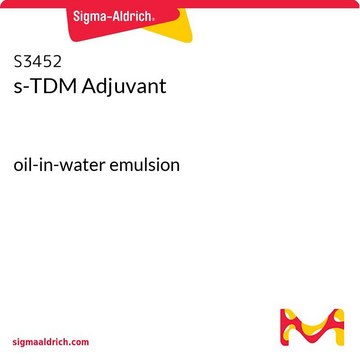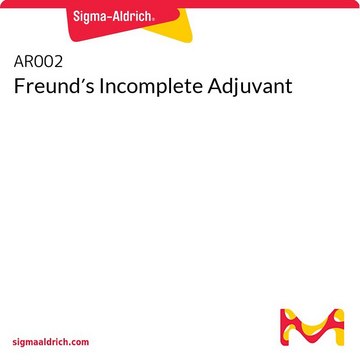M4537
Mycolic acid from Mycobacterium tuberculosis (bovine strain)
Sign Into View Organizational & Contract Pricing
All Photos(1)
About This Item
Recommended Products
biological source
Mycobacterium tuberculosis (bovine strain)
description
mixture of homologous acids
form
powder
functional group
carboxylic acid
lipid type
unsaturated FAs
storage temp.
−20°C
Biochem/physiol Actions
Mycolic acids are long chain fatty acid containing molecules found in the cell walls of mycolata taxon bacteria. Mycolic acid from Mycobacterium tuberculosis (bovine strain) may be used to study mechanisms of resistance to antibiotic drug treatment and the toxicity of tuberculosis bacteria.
Storage Class Code
11 - Combustible Solids
WGK
WGK 3
Flash Point(F)
Not applicable
Flash Point(C)
Not applicable
Certificates of Analysis (COA)
Search for Certificates of Analysis (COA) by entering the products Lot/Batch Number. Lot and Batch Numbers can be found on a product’s label following the words ‘Lot’ or ‘Batch’.
Already Own This Product?
Find documentation for the products that you have recently purchased in the Document Library.
Customers Also Viewed
Guanghou Shui et al.
EMBO molecular medicine, 4(1), 27-37 (2011-12-08)
Mycolic acids are attractive diagnostic markers for tuberculosis (TB) infection because they are bacteria-derived, contain information about bacterial species, modulate host-pathogen interactions and are chemically inert. Here, we present a novel approach based on mass spectrometry. Quantification of specific precursor
Asselineau, J.
The Bacterial Lipids, - (1962)
Mervyn Beukes et al.
Chemistry and physics of lipids, 163(8), 800-808 (2010-09-30)
Cell wall mycolic acids (MA) from Mycobacterium tuberculosis (M.tb) are CD1b presented antigens that can be used to detect antibodies as surrogate markers of active TB, even in HIV coinfected patients. The use of the complex mixtures of natural MA
Kapil Tahlan et al.
Antimicrobial agents and chemotherapy, 56(4), 1797-1809 (2012-01-19)
SQ109, a 1,2-diamine related to ethambutol, is currently in clinical trials for the treatment of tuberculosis, but its mode of action remains unclear. Here, we demonstrate that SQ109 disrupts cell wall assembly, as evidenced by macromolecular incorporation assays and ultrastructural
Anna E Grzegorzewicz et al.
Nature chemical biology, 8(4), 334-341 (2012-02-22)
New chemotherapeutics active against multidrug-resistant Mycobacterium tuberculosis are urgently needed. We report on the identification of an adamantyl urea compound that shows potent bactericidal activity against M. tuberculosis and a unique mode of action, namely the abolition of the translocation
Our team of scientists has experience in all areas of research including Life Science, Material Science, Chemical Synthesis, Chromatography, Analytical and many others.
Contact Technical Service











